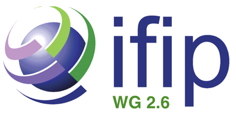7th International Symposium on Data-driven Process Discovery and Analysis
The IFIP International Symposium on Data-Driven Process Discovery and Analysis (SIMPDA 2017) offers a unique opportunity to present new approaches and research results to researchers and practitioners working in business process data modelling, representation and privacy-aware analysis.
The symposium will bring together leading researchers, engineers and scientists from around the world. Full papers must not exceed 15 pages. Short papers are limited to at most 4 pages. All papers must be original contributions, not previously published or under review for publication elsewhere. All contributions must be written in English and must follow the LNCS Springer Verlag format. Templates can be downloaded from: http://www.springer.de/comp/lncs/authors.html.
Accepted papers will be published in a pre-proceeding volume of CEUR workshop series. The authors of the accepted papers will be invited to submit extended articles to a post-symposium proceedings volume which will be published in the LNBIP series (Lecture Notes in Business Information Processing, http://www.springer.com/series/7911), scheduled for late 2018 (extended papers length will be between 7000 and 9000 words). Around 10-15 papers will be selected for publication after a second round of review.
Topics of interest for submission include, but are not limited to:
- Business Process Modeling languages, notations and methods
- Lightweight Process Model
- Data-aware and data-centric approaches
- Process Mining with Big Data
- Variability and configuration of process models
- Process simulation and static analyses
- Process data query languages
- Process data mining
- Privacy-aware process data mining
- Process metadata and semantic reasoning
- Process patterns and standards
- Foundations of business process models
- Resource management in business process execution
- Process tracing and monitoring
- Process change management and evolution
- Business process lifecycle
- Case studies and experience reports
- Social process discovery
- Crowdsourced process definition and discovery
Workshop Format
In accordance to our historical tradition of proposing SIMPDA as a symposium, we propose an innovative format for this workshop:
The number of sessions depend on the number of submissions but, considering the previous editions, we envisage to have four sessions, with 4-5 related papers assigned to each session. A special session (with a specific review process) will be dedicated to discuss research plan from PhD students.
Papers are pre-circulated to the authors that will be expected to read all papers in advance but to avoid exceptional overhead, two are assigned to be prepared with particular care, making ready comments and suggestions.
The bulk of the time during each session will be dedicated to open conversations about all of the papers in a given session, along with any linkages to the papers and discussions within an earlier session.
The closing session (30 minutes), will include a panel about open challenges during which every participant will be asked to assemble their thoughts/project ideas/goals/etc… that they got out of the workshop.
Call for PhD Research Plans
The SIMPDA PhD Seminar is a workshop for Ph.D. students from all over the world. The goal of the Seminar is to help students with their thesis and research plans by providing feedback and general advice on how to use their research results.
Students interested in participating in the Seminar should submit an extended abstract describing their research. Submissions can relate to any aspect of Process Data: technical advances, usage and impact studies, policy analyses, social and institutional implications, theoretical contributions, interaction and design advances, innovative applications, and social implications.
Research plans should be at most of 5 page long and should be organised following the following structure:
- Abstract: summarizes, in 5 line, the research aims and significance.
- Research Question: defines what will be accomplished by eliciting the relevant the research questions.
- Background: defines the background knowledge providing the 5 most relevant references (papers or books).
- Significance: explains the relevance of the general topic and of the specific contribution.
- Research design and methods: describes and motivates the method adopted focusing on: assumptions, solutions, data sources, validation of results, limitations of the approach.
- Research stage: describes what the student has done so far.
Call for Demonstrations and Posters
Demonstrations showcase innovative technology and applications, allowing for sharing research work directly with colleagues in a high-visibility setting. Demonstration proposals should consist of a title, an extended abstract, and contact information for the authors, and should not exceed 10 pages.
Posters allow the presentation of late-breaking results in an informal, interactive manner. Poster proposals should consist of a title, an extended abstract, contact information for the authors, and should not exceed 2 pages.
Accepted demonstrations and posters will be presented at the symposium. Abstracts will appear in the proceedings.



